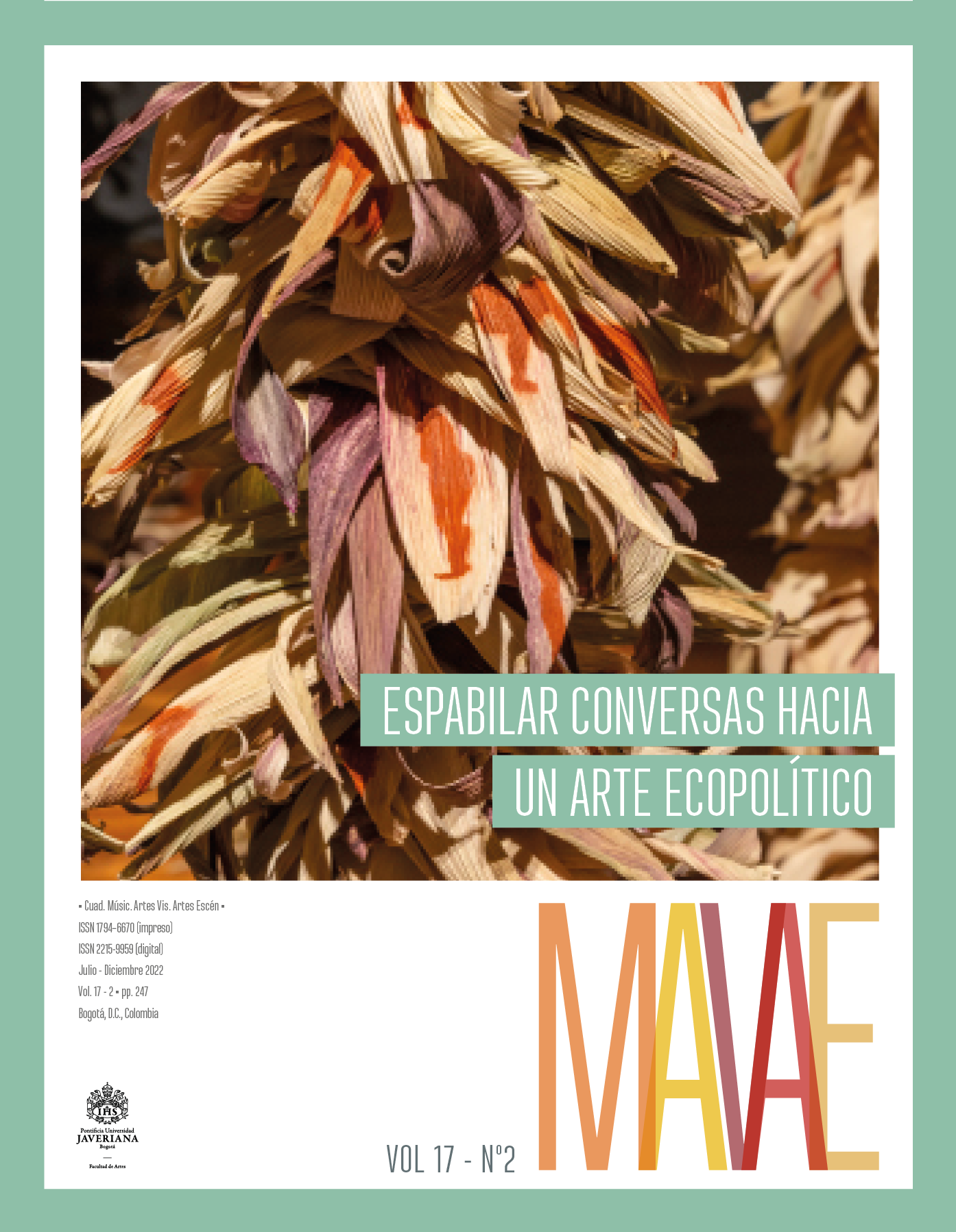Resumen
Este artículo es un ejercicio de teoría-ficción en el que los dos autores piensan críticamente sobre el estricto y eurocéntrico marco de construcción de conocimiento humanista tradicional que siempre ha privilegiado la visión como herramienta para analizar lo no humano. Durante el ejercicio de crítica, se ofrece la praxis de la escritura como una metodología; es decir, una posible salida al impasse de la visión humanista a través de relatos ficticios y ensambles teóricos poco ortodoxos con la intención de ir más allá de la visualidad a través de evocaciones táctiles, oníricas y experienciales. El objetivo es partir desde otros sentidos para abrir posibilidades de analizar cómo el conocimiento podría construirse de manera distintas desde el Sur global, el cual ha sido observado y relamido por la tradición antropocéntrica ocular.
Aulestia, Miguel Ángel J. 1999. El proceso de individuación y el continuo normalidad-patología: Una aproximación hacia una teoría unificada sobre el trastorno mental. Madrid: Fundamentos.
Bratton, Benjamin. 2021. La terraformación: Programa para el diseño de una planetariedad viable. Buenos Aires: Caja Negra.
Benjamin, Walter. 2002. Selected Writtings. Vol. 1: 1913-1926. Cambridge: Harvard University Press.
Colebrook, Claire. 2020. “Enmarcando el fin de la especie: Imágenes sin cuerpos”. https://diecisiete.org/creacion/enmarcando
Deleuze, Gilles y Felix Guattari. 2010. El anti-Edipo: Capitalismo y esquizofrenia. Buenos Aires: Paidós.
Fisher, Mark. 2018. Los fantasmas de mi vida: Escritos sobre depresión, hauntología y futuros perdidos. Buenos Aires: Caja Negra.
Galera, Andrés. 2005. El concepto biológico de naturaleza: Un instrumento cognitivo. Endoxa: Series Filosóficas, n.º 19: 359-372. https://digital. csic.es/handle/10261/14885
Gander, Ryan. 2019. The End. Nueva York: Lisson Gallery.
Greenfield, Susan. 2008. The Quest for Meaning in the 21st Century.
Londres: Sceptre.
Heidegger, Martin. 2009. Ser y tiempo. Madrid: Trotta.
Hui, Yuk. 2020. Fragmentar el futuro: Ensayos sobre tecnodiversidad. Buenos Aires: Caja Negra.
Krumpel, Heinz. 2001. Ilustración, Romanticismo y utopía en el siglo XIX: La recepción de la filosofía clásica alemana en el contexto intercultural de Latinoamérica. México: Universidad Autónoma Metropolitana Unidad Iztapalapa.
Negarestani, Reza. 2016. Ciclonopedia: Complicidad con materiales anónimos. Madrid: Materia Oscura.
Penas, Miguel. 2014. Individuación, individuo y relación en el pensamiento de Simondon. Barcelona: Universidad Autónoma de Barcelona.
Smith, Bruce. 2009. The Key of Green: Passion and Perception in Renaissance Culture. Chicago: University of Chicago Press.
Torres, Helen y Donna Haraway. 2020. “Seguir con el problema de Donna Haraway / conversación entre Donna Haraway y Helen Torres”. https://www.youtube.com/watch?v=-WN6SYkjQSs.
Yates, Julian. 2013. “Orange”. En Prismatic Ecology: Ecotheory beyond Green, editado por Jeffrey Jerome Cohen, 83-101. Minneapolis: University of Minnesota Press.
Zylinska, Joanna. 2020. Al Art: Machine Visions and Warped Dreams.Londres: Open Humanities Press.

Esta obra está bajo una licencia internacional Creative Commons Atribución 4.0.


